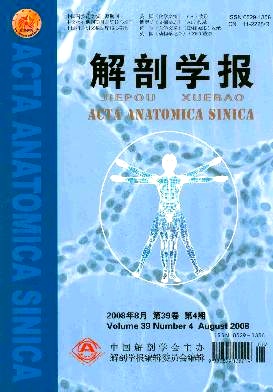|
|
Sodium 4-phenylbutyrate ameliorates traumatic brain injury in rats by reducing endoplasmic reticulum stress
2012, 43 (4):
451-457.
doi: 10.3969/j.issn.0529-1356.2012.04.004
Objective To investigate the expression of the endoplasmic reticulum stress-associated proteins glucose regulated protein 78 (GRP78), phosphorylation pancreatic ER kinase (p-PERK) and C/EBP homologous protein (CHOP) in rats after traumatic brain injury (TBI), and the mechanism of sodium 4-phenylbutyrate (4-PBA) on neuronal injury by reducing endoplasmic reticulum stress after TBI. Methods A total of 114 male Sprague-Dawley rats were randomly divided into 3 groups: the sham, TBI, TBI plus 4-PBA groups. A rat model of diffuse brain injury was established according to Marmarou’s falling model. The rats in 4-PBA group were treated with 4-PBA (120 mg/kg) i.p. immediately after TBI, once a day for 3 days. At 3, 6, 12, 24, 48 and 72 hours after injury, the brain tissue samples were prepared for examination of brain pathological changes, and determination of the expression of GRP78, p-PERK and CHOP, by means of immunohistochemistry and Western blotting. Behavioral tests were performed at 24, 48 and 72 hours after injury. Results Compared with the sham group, GRP78, p-PERK and CHOP were significantly increased in the TBI group. GRP78 began to increase at 3 hours after injury, peaked at the 12 hours, and then gradually returned to the basic level. P-PERK peaked at 12 hours, whereas, CHOP peaked at 24 hours,and then reduced at 48-72 hours,but still was higher than the basic level. At the corresponding times, compared with the TBI group, the expression of GRP78, p-PERK and CHOP decreased remarkably in the 4-PBA group(EM>P/EM> <0.05). The scores of behavioral test were significantly increased in 4-PBA group,compared with TBI group(EM>P/EM> <0.05). Conclusion Endoplasmic reticulum stress is started after traumatic brain injury in rats. 4-PBA has a protective effect on TBI, which ma
Related Articles |
Metrics
|


